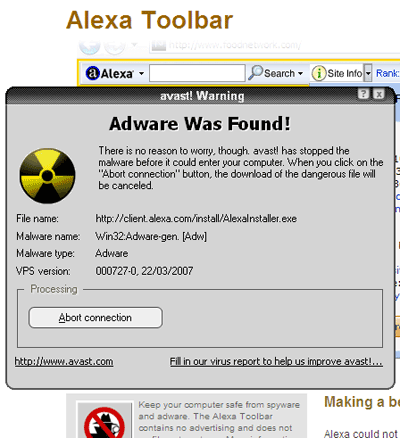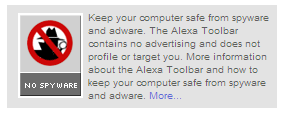At least, that is what my virus scanner told me.
Today I was wanting to be a “regular reader” to some of my sites, so I switched back to Internet Explorer, and I got myself equipped with the Google Toolbar and Alexa Toolbar.
I didn’t have these installed on Firefox, because the SearchStatus add-on could help me tell the Google PageRank and Alexa Traffic Rankings of the sites (which is essentially what I need for each of the toolbars).
To my horror, when I tried to install the Alexa Toolbar, my virus scanner told me that the toolbar comes with Adware! 😯

Now, tell me. Which should I believe – the virus scanner, or Alexa?
I guess I won’t take chances. Out you go, Alexa. I’ll stick to Firefox and SearchStatus. I’d browse happy. 🙂
Interestingly Alexa has a nice little box on the toolbar download page that goes like this:

My oh my… looks like something went wrong somewhere huh.

Haha…. sometimes anti-virus scanners can behave like adware products themselves! Simply by popping up now and then with upgrades, reminders, and so on….
thats alexa for you they’ve always used spyware why I never touch alexa.
Walter, you got a point. Maybe its the anti-virus scanner is behaving erratically. So ironic. Actually last time I have thought about this – can anti virus programs be infected by viruses? 😛
Mark, thanks! In that case Alexa becomes pretty useless huh? The rankings are not really representative and the toolbar uses spyware!
Thank Kian Ann,
Me better uninstall tonight. 🙂
John Tan
http://www.JohnTanBlog.com
Heh John, use Firefox! 😛
The Alexa toolbar monitors browsing habits in order to compile the Alexa stats. This type of “snooping” behavior is consider to be a malware trait and has gotten the toolbar flagged by most antivirus system.
Looking past a bit of spying, some frivolous network traffic, a few spare cpu cycles and a prime strip of browser real estate it’s not all bad (or is it?).
Typically each toolbar user’s traffic is amplified by a very large factor to get a ballpark figure of traffic patterns, this presents the opportunity for a small group of users or a single user exploiting multiple accounts to significantly skewer the Alexa statistics.
Another potential issue might be a malicious exploit that hooks into the relatively insecure local toolbar via javascript to elevate access permission beyond those normally granted to remote scripts.
@ Kian Ann: AV scanners are a prime target for “smart” viruses trying to operate in stealth mode. Some taint the AV software while others have been known to disable and then mimic the user interface to provide a false sense of security. Rootkits take this a step further and go directly for the system kernel to hide their presence. Still, the most disturbing attack I’ve witnessed was an internet worm that gained entry to systems via Norton Anti-Virus’s “LiveUpdate” service. Now there’s irony for you.
I have the same anti-virus software you have (avast) I would believe them before any toolbar! I have google toolbar and it never had a problems with it so I think any toolbar I try to install and that warning pops up, its not going on my computer! Would rather be safe than sorry!!!
Thank you for the info sharing. I’ve read about this from other people’s experience & personally have the same experience too. Its too common the toolbars actually bring out lot of problem to the users.
Hmmm, i personally wouldn’t take my chances, that is once Avira’s Anti-Virus program pops up with a warning.
Avira says: Contains recognition pattern of the DR/AlexaBar.N.207 dropper.
Of course it’s been configured for maximum sensitivity (better safe than sorry).
I’ve also personally seen exactly how inaccurate Alexa’s statistics actually are, that is, unless you’re in the top 500 (very difficult to reach that one).
Hi Hristiyan,
Yes, Alexa stats are inaccurate.
If you rank high, you have very good traffic, but anything below 20,000 only tells you that there isn’t a flow of net savvy visitors.
Here is Matt Cutts’ thoughts on Alexa Traffic 2 years ago
Its funny, because I do use a FireFox plugin with Alexa Rankings, and I was working on a client’s project – and with just ME accessing the site many times a day to make changes to the site, I upped the rankings from the initial 26 mil to 6 mil within 2 weeks. Heh.
I have just downloaded the alex toolbar but Avast says it is a virus! Oh my, I can not delete it. Pls help. Thanks.
😯 Here’s something interesting I just read. It was actually posted a while back, but it explains how your system classifies Alexa tool bar.
—–
http://blog.tmcnet.com/blog/tom-keating/microsoft/windows-defender-calls-alexa-toolbar-trojan.asp
So does Microsoft have it in for Alexa? What gives? This is a valuable tool used by millions of users to track their own traffic and their competitors traffic. Yes, it is a “form” of spyware since it reports your web surfing habits, but it certainly isn’t a “trojan clicker”. Clearly this is a mis-classification on Microsoft’s part. Also, the risk level should be “Medium” at worst – not “High”. I should add that most users that install the Alexa toolbar are aware that it reports which websites you visit .
I’m going to research this some more and post more here. Stay tuned!
Update:
One theory I have is that the actual Win32/VB.BZ “TrojanClicker” uses a very similar “signature” that Alexa does. Anti-virus and anti-spyware programs rely on signature fingerprints to identify threats. It’s possible Win32/VB.BZ “TrojanClicker” was developed with a similar signature as Alexa on purpose to try and masquerade itself as the Alexa toolbar. In the process of trying to look like Alexa’s signature, Microsoft Defender is probably identifying the Alexa Toolbar incorrectly.